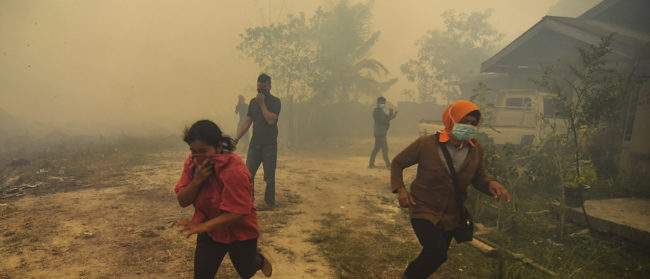It takes Siraphob Attohi three hours to transform from a harried student into his drag queen persona Masala Bold — a wisecracking MC, who raises calls for gender equality during Thailand’s protests for democratic reforms.
A regular at Bangkok’s student-led rallies, Masala Bold’s glamorous presence and ribald jokes provide a teasing interlude between speeches from protest leaders demanding the resignation of Thailand’s premier and reforms to the monarchy.
But far from being simply an entertainer, theatre student Siraphob — who goes by the nickname Raptor and identifies as male offstage — says the movement’s goals align with the LGBTQ community’s desire for gender equality.
“If we can’t get real democracy in Thailand, then the rights for the LGBTQ community wouldn’t exist either,” he tells AFP.
“So it’s my pleasure and my honour to use my theatre skills to be an activist and to help people, but actually it’s all about my future too.”
The 21-year-old and other prominent LGBTQ personalities have played a very visible role in the youth-led movement since it kicked off in July.
In demonstrations where the vibe can turn from festive to tense in just a matter of minutes, they have stood alongside black-clad protesters, dressed in eye-catching outfits and unfurling massive rainbow flags.
The protesters’ key demands are for royal reforms, a rewrite of a military-scripted constitution and for the resignation of army chief-turned-premier Prayut Chan-O-Cha.
But embedded in these core goals lies a clear path to marriage and gender equality in Thailand, says Angele Anang, a prominent transgender drag queen and the winner of popular reality show Drag Race Thailand.
“We don’t have the same rights,” she says, adding that the community’s greatest goal is for same-sex marriage to be legalised in Thailand.
“It is the key to unlocking inequality.”
‘Branded and stereotyped’
Thailand’s vibrant and diverse LGBTQ community — visible in media and in Bangkok’s famed nightlife — has helped the kingdom foster a reputation of tolerance.
But the reality is far less rosy.
Discrimination is rife for transgender people, who often find themselves missing out on job opportunities, and gay and lesbian stereotypes proliferate on television variety shows and films.
“We’re branded and stereotyped — it is not true acceptance,” says Raptor, as he gets ready for a protest doubling as a gay pride parade.
“It’s just acknowledging that we exist and categorising us how they see fit.”
Reforming the monarchy means we get rid of the different classes and aristocratic hierarchy, so everybody — including the LGBTQ community — will be equal
As Raptor paints his skin green, he tells AFP that this time Masala Bold will dress as Elphaba from “Wicked” — the hit Broadway musical retelling the “Wizard of Oz” from the witch’s perspective.
The choice is pointedly political — Raptor explains that green-skinned Elphaba is ostracised growing up, and later exiled from Oz when she goes up against the powerful wizard.
“It’s the same situation as Thailand,” he says, referring to how pro-democracy activists have in the past fled to Europe to seek asylum for criticising the powerful monarchy.
‘The new taste of Thai politics’
Reforming the monarchy is the most ambitious and shocking demand from the pro-democracy movement.
A taboo subject in Thailand, the king is traditionally regarded as a demi-god and his influence permeates every aspect of society.
The students’ calls for change include the abolition of a draconian royal defamation law — which shields him from criticism — and for King Maha Vajiralongkorn to “stay out” of Thailand’s turbulent politics.
“Reforming the monarchy means we get rid of the different classes and aristocratic hierarchy, so everybody — including the LGBTQ community — will be equal,” says transgender activist Sitthinon “Faison” Songsiri.
A graduate from Thammasat University — one of Thailand’s most liberal schools and a bastion of activism — the 25-year-old says her role as an emcee in demonstrations has empowered her.
“We are the new taste of Thai politics,” she says.
The kingdom’s protest-filled recent history is replete with rally leaders delivering “uncompromising” speeches, she says, which leads to opposition groups blaming them for instigating violence.
But “we make the rallies lighter, funnier and less stressful,” Faison says.
“At the same time, we make society more accepting towards our community.”
While Faison faces a raft of charges — including sedition — for participating in the protests, she is determined to continue to be a visible face.
“We need the people to look beyond our make-up, wigs and dresses, and listen to what we want to say regarding the same-sex marriage and gender equality,” she tells AFP.
“If we fight together, the chances of succeeding in our cause is faster and better.”
© Agence France-Presse


